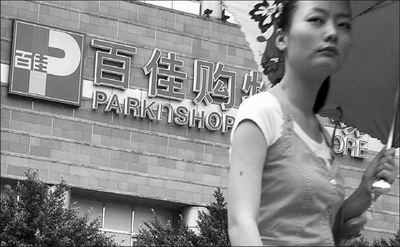
China Resources Enterprise Ltd, a mainland-based retail and beer conglomerate, said it may partner with United Kingdom-based grocery chain Tesco Plc to bid for billionaire Li Ka-shing's Hong Kong supermarket chain.
CRE said it may raise debt and does not rule out selling non-core assets to fund the planned ParknShop acquisition.
CRE's Chief Financial Officer Frank Lai confirmed on Tuesday, at the company's annual earnings news conference, that CRE has submitted a bid for ParknShop at a reasonable price. He added that the supermarket chain is a quality asset, which is well operated by Hutchison Whampoa Ltd.
HWL, which is controlled by tycoon Li, said earlier it is considering selling ParknShop, one of the two largest chains in Hong Kong's $6.6 billion supermarket industry. The sale is estimated to fetch between $3 billion and $4 billion.
In addition to CRE, the deal attracted at least eight other offers, including those from private equity firms KKR & Co LP and TPG Capital. Sun Art Retail Group Ltd, Japan's Aeon Co, South Korea's Lotte Shopping Co and Australian retailers Woolworths Ltd and Wesfarmers Ltd have also submitted bids.
Earlier this month, CRE announced a joint venture with Tesco that will see the UK company merge its 131 stores on the mainland with those of the Hong Kong-listed company. CRE will hold an 80 percent stake in the joint venture, while the UK retailer will own the rest, the companies said.
ParknShop, which posted revenue of HK$21.7 billion ($2.8 billion) last year, has more than 345 outlets in Hong Kong, Macao and the mainland.
Sales growth in the city's supermarket industry slowed to 7.9 percent year-on-year in May from last year's annual increase of 11 percent and a 2011 peak of 13 percent, government data showed.
Meanwhile, CRE's net income dropped 54 percent to HK$1.02 billion for the six months ended June from HK$2.24 billion in the same period last year, as weaker economic growth in the world's second-largest economy and a government campaign to curb lavish spending with public funds hurt its business, the company said in a statement to Hong Kong's stock exchange on Tuesday.
Profit attributed to shareholders, excluding asset revaluations and major disposals, decreased 11 percent to HK$1.01 billion, lower than the average HK$1.07 billion estimate compiled by Bloomberg.
Revenue rose 12.3 percent to HK$71.85 billion for the period.
"Looking forward to the second half of 2013, the short-term operating environment and consumer sentiment are both likely to be affected by the volatile global economy," CRE said in the statement on Tuesday.
"The overall economy is not good and the consumer price index has been pretty low and that hurt their retail business," said Charlie Chen, a Hong Kong-based analyst at BNP Paribas Securities Asia.
Profit in CRE's retail division, which includes its hypermarkets and coffee shops and accounted for more than half of the company's earnings in the first half, dropped 64 percent to HK$637 million.
CRE's beer division, which makes China's best-selling Snow brand with SABMiller Plc, posted a 4.5 percent decline in profit to HK$358 million.
Profit at its food unit, which sells products including rice and frozen items, dropped 51 percent to HK$71 million, while profit at the beverage unit rose 30 percent to HK$39 million.
Tough competition in the retail and beer segments will continue to weigh on CRE's earnings, with promotions, rather than demand, boosting sales, Kenny Wu, a Hong Kong-based analyst at JI-Asia Research Ltd, wrote in a report this month.
CRE operated 4,448 retail stores, ranging from hypermarkets to wine cellars, as of March 31, it said.
CRE and US-based Wal-Mart Stores Inc were tied in the second place last year in China's hypermarket industry with an 11 percent share each. That lagged behind the 14 percent share held by Sun Art Retail Group Ltd, which is backed by France's Groupe Auchan SA, according to Euromonitor International.
CRE's shares rose nearly 1.5 percent to close at HK$23.7 in Wednesday trading. The stock has declined 18 percent this year, compared with the 4 percent decrease of the benchmark Hang Seng Index.
Bloomberg contributed to this story.





